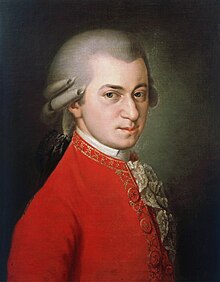
The Symphony No. 4 in D major, K. 19, by Wolfgang Amadeus Mozart was composed in London during the Mozart family's Grand Tour of Europe in 1765, when Mozart was nine years old. [1]
Background
Even though the original of Mozart's manuscript has not survived, the set of parts written in the hand of his father, Leopold Mozart, is preserved in the Bavarian State Library in Munich. [1] It is known today that the early symphonies by young Mozart were performed at the public concerts in the Little Haymarket Theatre in London. It is therefore possible that these parts were written for one of these public performances, [1] although Zaslaw concludes that the work was composed or at least completed in The Hague. [2]
Structure
The work is scored for two oboes, two horns in D, and strings.
There are three movements, as was standard in the early classical music era in which the child Mozart wrote, in the typical fast–slow–fast configuration. They are as follows:
-
Allegro, D major,
 (
Common time), 78
bars
(
Common time), 78
bars -
Andante,
G major, 2
4, 45 bars -
Presto, D major, 3
8, 106 bars
References
- ^ a b c Mozart, Wolfgang Amadeus (2005). Die Sinfonien I. Translated by Robinson, J. Branford. Kassel: Bärenreiter. p. X. ISMN 979-0-006-20466-3.
- ^ Zaslaw, Neal (1991). Mozart's Symphonies: Context, Performance Practice, Reception. Oxford: Clarendon Press. pp. 44–45. ISBN 0-19-816286-3.
External links
- Symphony in D K. 19: Score and critical report (in German) in the Neue Mozart-Ausgabe
- Symphony No. 4: Scores at the International Music Score Library Project
- Symphony No. 4 in D major, K.19. Mp3.
![\relative c' { \set Staff.midiInstrument = #"string ensemble 1"
\key d \major
\tempo "Allegro" \set Score.tempoHideNote = ##t \tempo 4 = 144
d4~\f d8. a16 d4( fis8.) a,16 |
d4~ d8. a16 d4( fis8.) a,16 |
d8[ r b''\p] r a[ r g] r |
fis8[ r g] r fis[ r e] r | <d, d'>4\f
}](https://upload.wikimedia.org/score/h/k/hkh1j1io9vebfl9vuivncv76vdha730/hkh1j1io.png)